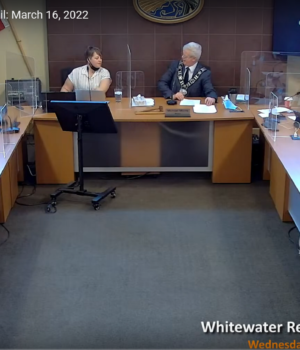The Council of the Township of Whitewater Region received this report for information purposes and direct the Fire Chief to prepare for the pending mandatory firefighter certification.
Chief Jonathan McLaren said that there was an amendment to the Fire act that would stipulate what training is mandatory for firefighters.
He said a similar motion was put forward in 2017, but it disappeared
“With our department being what’s considered a full-service department we would have to train to Firefighter level One and Two as well as Hazmat Operations level and Company Officers level One. We have four years to do that, which is definitely attainable and an additional two years for a technical certification for our rescue stations. With an department our size we’re going to pursue a learning contract for Firefighter Level One as well as a company officer contract. Both will be taught in-house.There is a 65 enrollment fee per firefighter but the rest is done in house.”
“Most of this training would be taking place anyway, it’s just happening in a slightly different fashion.”
He said there was still details to be decided on the Hazardous Materials training.
He said the firefighter level One Course was approximately 150 hours “almost split half and half between theory and practical”. He said the theory would be provided online. With the remaining portion done in-person with the Department’s own instructors.
He said the Firefighter Level Two course was about 80 hours and was ‘split fairly evenly’, and had a written test and practical evaluation, with staff and proctors provided, with the Township providing the facility.
“There is going to be a little bit extra training on things we maybe didn’t emphasize in the past, but it’s not going to be overwhelming.” McLaren said, noting that the Firefighter Level One training course would cost $1200 to send trainees out.and required nine days of in-person training and an online portion.
“People will be giving up three long weekends just to take these courses. With the Fire college being there’s no place to go for free accommodations anymore or food. I think the only way to really do this economically and meet the time-frames is to teach this in-house. We definitely have the expertise to do it.”
He said that the Department was required to send in resumes for the instructors to ensure they meet the requirements, and that they had already done so.
He said that there would be ‘ a fair bit of administrative work’ and that the lack of a facility to perform the evaluations would be an issue.
Mayor Moore commented that it was “very discouraging that they start something and they show us that they never finish.”
He also asked if the Firefighters should be called Volunteer Firefighters anymore and if there was a difference between Volunteer Firefighters and Firefighters
“I think that verbiage is really something that needs to end.” McLaren said. “There’s really no difference as far as recommendations for service and level of training requirement. It’s going to be part-time and full-time is probably a more accurate description.”
“If they continue, are they going to be respected for it?” Mayor moore said. “That was another problem at the end of it, people did the training and they wouldn’t acknowledge it.”
Reeve Regier asked if there was anything ‘repetitive’ through all the municipalities. “With the LEG is there anything we can do to alleviate these costs if we combine forces?”
McLaren said that Whitewater Region, as a large department, might be able to ‘take the lead’ regarding the other municipalities, and that other municipalities might not have the numbers to meet student requirements.
“If you do bring in other students from other municipalities take part in our training, what that mean for our insurance policy?” Mayor Moore asked.
“So if it’s a contract with the outside person bringing in, it’s just filling people in a classroom. We do it all the time for other areas.” CAO Trembley said. “I should note that there are other fire-chiefs kicking and screaming about it; while I think Jonathan and I of the mind that this is kind of inevitable. We want to keep our firefighters safe and that they’ve received adequate training. Filling the classroom would be cost efficient for everybody”
“Does that mean we’re going to seek remuneration from somebody coming in?” Mayor Moore asked.
“Honestly my take on it is that it’s a smaller number, maybe one or two students, it doesn’t really change our costs. ” McLaren said. “They would pay our $65 to the province. The rest whether we have twelve students or fourteen students, it’s more kind of in good faith. It does help us in the long run; we’ll know they’re trained to a level they’ll know we’re trained to a level, it’ll make integration better on calls, having everyone working on the same playbook is a benefit.”
“Is there any thought given to the County then coming up with the training facility or is that dead int he water?”
McLaren said that the attempt to get a facility was “still pending at CNL” but “it doesn’t seem to be getting a lot of traction.”
“Dealing with a private enterprise has been a challenge.” he said. “Right now there’s nothing pending.”
“We demand a lot of our part-time firefighters.” Nicholson said. “They support the community in tremendous ways. I think programs like this training online keeps them closer to home so they’re losing less time away from their families. I think there’s less impact. I think the viewpoint, especially looking into the future, I think having our own training facility keeps them closer to home. It becomes a center of excellence for our guys. I look forward to seeing it in future budgets.”
The motion was carried.







![Kenopic/Smith Auction [Paid Ad]](https://whitewaternews.ca/wp-content/uploads/2018/10/advertising-100x75.jpeg)

